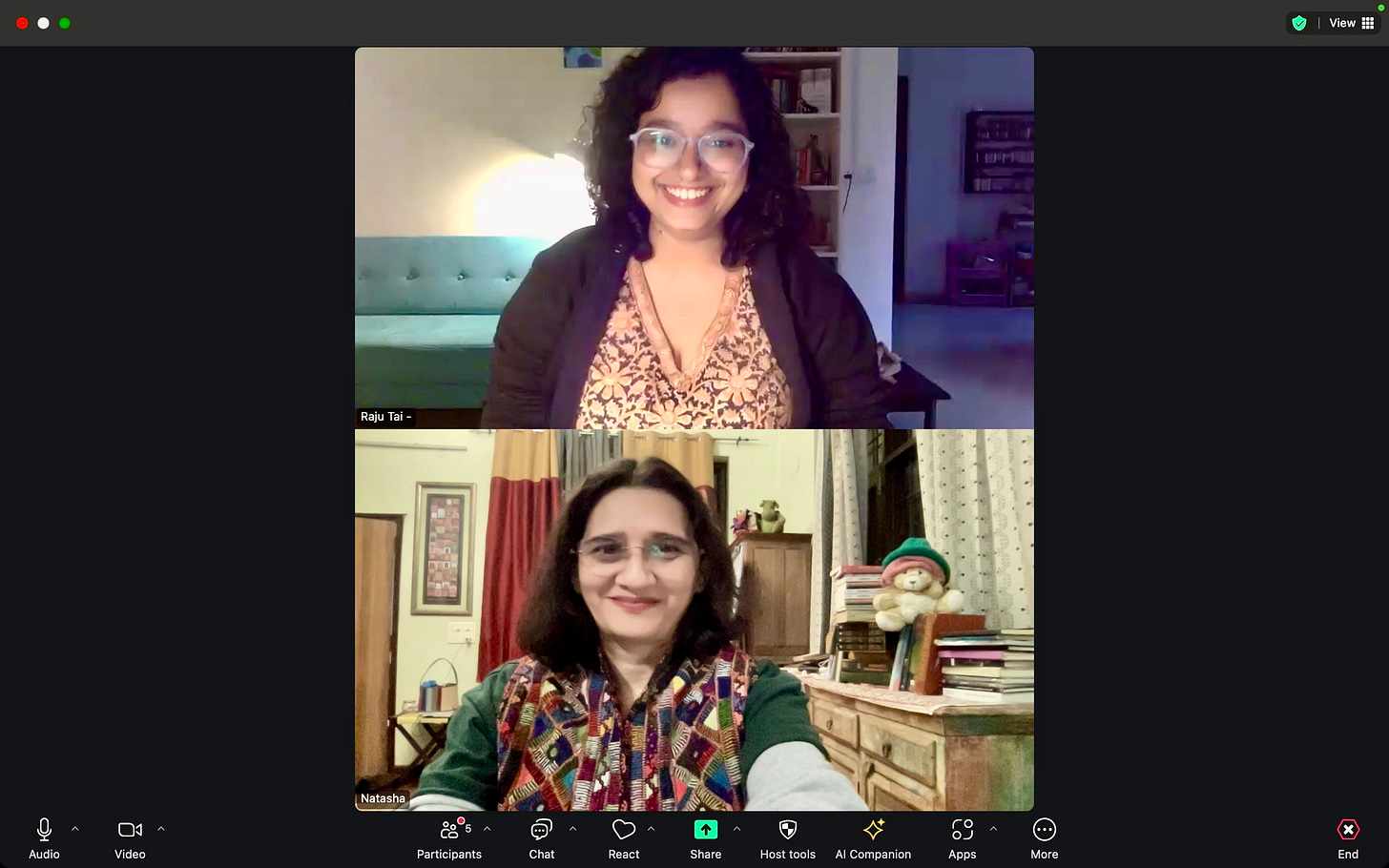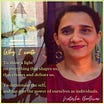Stories that demand to be told | #27
I feel ravaged, humiliated, kidnapped by the cold. If I have a tendency to indulge in self-pity, it’s 10x during those bleak days when the sun disappears like a recently-married friend.
This is the 27th edition of Stories that demand to be told, a curated spread of the most evocative, resonant, real stories. Welcome to Ochre Sky Stories, a home for writers from the Ochre Sky Workshops, facilitated by
and .1. One Sunday Afternoon by
Eyes closed, she’s transported to the ocean. Floating. When the water rushes to fill her ears, it drowns out all thought. All control. She’s held by something much larger than herself. Her body rises up and down with the crest of each wave that carries her. It is just her, the sky and the sun in her face. Weightless. Free.
Her skin tightens. If she moves the muscles in her cheek or opens her mouth, the besan will crack. The water in the basin has cooled. The skin on her feet is wrinkling.
She remembers the Sunday ritual of her childhood. Warm coconut oil with kadhipatta (curry leaf) steeped in it. Her mothers hands massaging her head, fingers at her temples, tracing the contours of her ears to massage the place where her glasses would rest. An ache she didn’t know she had. Leaning back, she would rest her head on her mother’s midriff. A feather light caress on her eyelids, fingers moving in circles around her eyes.
2. Mothers, shoots and leaves. by
My husband had been a newborn in the house where my first plants came from, and it was the house I visited after we were married twenty eight years later. The house was drawn, quartered and sold, but the plants were its physical legacy. My early relationship with my mother in law was reflected in my relationship with her plants. I tended to them with part awe, part trepidation. Every new bud, branch, berry was a personal vindication; and every browning leaf a harbinger of shame.
The time I spent tending to these plants coincided with my own mother dealing with two life-threatening illnesses. Her treatment involved six months of being hooked to machines in hospitals every other day to keep her body from collapsing, bookended by two critical surgeries. The gift of this nightmare was a year of living with my parents under the same roof, something I had accessed for only eleven years of my childhood.
When she was ill, I found myself defaulting to doctor mode. I learnt everything there was to know about her illnesses and their treatments, I scoured the likes of PubMed and Google Scholar, texted every single classmate-turned specialist for help and information, coordinated appointments, led discussions, decided on treatments. This is what I did best, putting all my years of education to the job of saving one person. I did not understand another form of caring. I had to learn it from the one I was trying to save.
3. Mummy, Money, and the Leopard by
The trophy may have been glistening, but it paled in comparison to the “cash prize” I had been awarded in a white, sealed envelope as my “Best Speaker” award. In those three crisp, pristine notes of 500 rupees each, I would savour my first bite of the pleasures afforded by self-earned money.
The Hindu College DebSoc (because “Debating Society” is for losers) had no idea that it was sponsoring my freedom from the cotton Libertina bras—as white as Nirupa Roy’s saree in Deewar (or any 70s film really)—that my mother would painstakingly buy from Sarita Undergarments in Old Faridabad on a 2+1 deal. For me, my grandmother, and herself.
The day after being awarded lingerie funds, I would go to the renowned Greater Kailash Market with Gunjan and Priyanka, who had promised to oversee my independence from Libertina’s clutches towards greener (or leopard print) pastures. Thus began the quest to win debating competitions to be able to buy bright, colourful, appealing (to whom? I did not ask then. But, mother did, much to my stress) underwear. I knew that I was not only violating some sort of generational underwear code but also committing a financial sin—who spends some 1000 bucks on a bra when Mrs. Sharma has historically bought you one for 250 rupees?
4. soul quests and kitchen tangents by
this morning while journalling i uncovered for myself that not self-abandoning is a very active sensorial process. it activates all the cells and delivers the self to the center of it’s reality - as a way to stay in the self.
so much focus on not self-abandoning made me consider the clunky mechanics of the language-ing of this and inquire as to why it does not taste like my slow cooked lamb roast with cabbage - caramelised and falling off the bone.
as a writer i have yet to generate a word that encapsulates this idea into an effervescent tablet, so like a lazy thinker i searched the interwebs for help: ‘opposite of self-abandonment what is.’
results were as follows: self-care / self-choosing / self-centering / self-accompaniment /self-recovery / self-repair / self-trust / self-friendship, etc. etc.
5. The Suburbans by
The once farmlands where our row house stood, as if in an English county boasting of a colonial hangover, had been connected to the toll road.
The metro had shot up the land prices but we were moaning the bursting of our bubble.
The night never slid in total blackness anymore, the grey filter had taken over.
The dispersed multi-coloured lights of the mall dimmed even the stars.
Conversations with the dead became tougher to navigate without these markers to space.
On moonless nights sometimes Venus would manage to travel through the layers of smog to make itself seen and I would see it as a sign.
The dystopian tomorrow had reared its ugly head into my today.
6. Write, I must... by
When I was in college, one of my dad’s closest friends Jagraj used to visit our house very often. He had a job with CEAT tyres and one day he brought me a set of some blank notebooks from the company. He told me that I should use them to write and he would provide me with a few writing prompts - ‘write about your aunt’, ‘describe your favourite friend’. So I would write, and when he came he would take the books and make some comments at the end of the piece. I still remember that when I wrote about my favourite Masi in Delhi and he said that I must always, always write!
Jagraj was considered to be some sort of a genius among his friends so this was really flattering. On the other hand he also said that he thinks the appropriate profession for me is forensic science (as in performing autopsies) which couldn’t be further from the truth so it is safe to say I should take the compliment about my writing with a tiny grain of salt!
The reason for sharing this anecdote is that whether Jagraj or anyone else thought I should write, I did it anyway. I still have my travel journals, my old diaries with the little locks, and I have weaved writing into my existence in some form or the other.
7. Decoding the chaos of verbal warfare by
“I must have been so desperate for you,” I said to my husband, making him laugh. “I was waiting for a time when we had a common language between us. Your idea of etiquette and my understanding of tehzeeb could easily have clashed because we were using different words for the same thing.”
Afzal and I had grown up in different contexts that were unfamiliar to the other. It was easy to accidentally confuse and misinterpret what the other meant. And ruin our relationship before it had a chance to become itself.
“I always knew you are a feminist,” I said to him with a smile on my face. “I got my confidence from there.” It was something he could not deny. We had enough common experiences by now to base our opinion of each other on actions rather than mere words.
I am remembering this conversation today in the context of the chaos of verbal warfare unleashed in today’s times. How quick we are to hurl labels at each other based on what we consider to be the values or loyalties of the other. How swiftly we write off those who seem different from us — as if the goal of communication is to cause rifts rather than build a bridge between people.
8. Adulting and Wintering by
Over the years, I have confronted how painful winter is for me, how much I need to do to simply bear it. Maybe another season tests your mettle, makes you unreasonably gloomy or irritable. Maybe not.
My existential angst, body aches and sensitivity are at their peak in winter. I feel ravaged, humiliated, kidnapped by the cold. If I have a tendency to indulge in self-pity, it’s 10x during those bleak days when the sun disappears like a recently-married friend. If I am alone, winter ensures I sense the loneliness deep in my bones. If I have trouble writing all year, in winter I forget I have language, pens, and fingers.
Worst of all, winter reminds me that I have a body, a body that has the audacity to demand time and attention. Can you believe it? It demands creamy moisture and thick covering. It protests my neglect. My skin becomes dust and marches to the inseam of my pants, my lips crack up, ribs hurt and crouch to hide the guttural scream for water and warm food. For a person disconnected from their body, self-care during bad weather doesn’t come naturally.

















